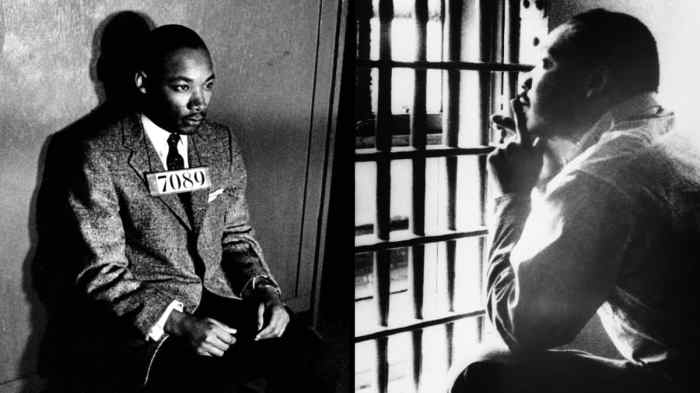Biblical allusions in letter from birmingham jail – The “Letter from Birmingham Jail,” penned by Martin Luther King Jr., is a seminal document in the Civil Rights Movement. It is replete with biblical allusions that serve to bolster King’s arguments and resonate with his audience. This essay will explore the types, examples, and impact of biblical allusions in the letter, shedding light on their significance in shaping the document’s message and influence.
Historical Context

The Letter from Birmingham Jail, written by Martin Luther King Jr. in 1963, is a pivotal document in the Civil Rights Movement. In response to criticism from fellow clergymen, King eloquently defended the nonviolent protests in Birmingham, Alabama, using biblical allusions to reinforce his arguments.
Biblical allusions play a significant role in the letter, serving multiple purposes. They provide historical and ethical context, establish King’s credibility as a Christian leader, and appeal to the moral conscience of his audience.
Types of Biblical Allusions, Biblical allusions in letter from birmingham jail
- Direct Quotations:King quotes directly from the Bible, such as “Do unto others as you would have them do unto you” (Matthew 7:12) and “Thou shalt not kill” (Exodus 20:13).
- Paraphrases:King rephrases biblical passages to convey their meaning in a contemporary context, such as “Justice too long delayed is justice denied” (Amos 5:24).
- Allusions:King refers to biblical characters or events without direct quotation or paraphrase, such as “I have also been crucified on the cross of disappointment and despair” (alluding to the crucifixion of Jesus).
Examples and Analysis

One of the most striking examples of biblical allusion is King’s comparison of the nonviolent protesters to the early Christians in the Roman Empire. He writes, “Just as the early Christians, who were persecuted by the Roman Empire for their loyalty to Christ, we are persecuted by those who oppose our nonviolent efforts to gain our rightful place in American society.”
This allusion serves multiple purposes. It highlights the historical precedent for nonviolent resistance, establishes King’s nonviolent approach as a continuation of the Christian tradition, and appeals to the audience’s sense of justice and fair play.
Impact and Influence
The biblical allusions in the Letter from Birmingham Jail had a profound impact on its reception and influence. They gave the letter an air of authority and credibility, appealing to the moral conscience of readers and shaping the public discourse on civil rights.
The letter’s powerful rhetoric, combined with its biblical allusions, helped galvanize the Civil Rights Movement and influenced the passage of landmark legislation, such as the Civil Rights Act of 1964 and the Voting Rights Act of 1965.
FAQs: Biblical Allusions In Letter From Birmingham Jail
What is the significance of the biblical allusions in the “Letter from Birmingham Jail”?
The biblical allusions serve to strengthen King’s arguments, appeal to his audience’s religious sensibilities, and establish a shared moral framework.
How do the allusions contribute to the letter’s tone?
The allusions lend a sense of urgency, moral authority, and emotional resonance to the letter.
What are some examples of biblical allusions in the letter?
King references the parable of the Good Samaritan, the Exodus story, and the teachings of Jesus Christ to illustrate his points.

